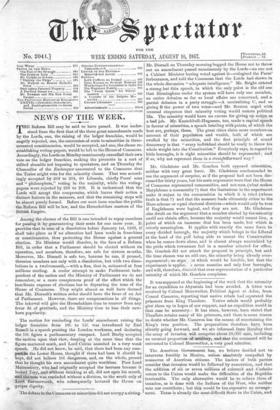Among the clauses of the Bill is one intended to
repay members for passing it by guaranteeing their seats for one more year. It provides that in case of a dissolution before January 1st, 1869, if shall take place as if no alteration had been made in franchises or constituencies, thus protecting the House against a general election. No Minister would dissolve, in the face of a Reform Bill, in order that a Parliament should be elected without its operation, and members, therefore, are safe for sixteen months. Moreover, Mr. Disraeli is safe too, because he can, if pressed, threaten members not only with a dissolution, but with two disso- lutions in a twelvemonth, —with a fine, that is, estimated at four millions sterling. A cooler attempt to make Parliament inde- pendent of the nation and the Ministry of Parliament we do not remember, or a more conspicuous proof of the effect which the inordinate expense of elections has in depraving the tone of the House of Commons. They might almost as well have decreed that Mr. Disraeli's written order should have the force of an Act of Parliament. However, there are compensations in all things. The interval will give the Householders time to recover from any fever fit of gratitude, and the Ministry time to lose their new- born popularity.






























